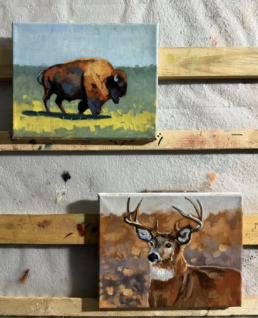Gone are the days of art professionals taking care of you and your art career.
We are each responsible for our own lives and our own choices as artists. The sooner you learn to take control of your art career, the better.
- Sometimes it is just a matter of looking at things you already know, and assessing this information in an organized manner.
- Other times, you need to learn from the experience of artists who have gone before you, so that you can cut through the chaos and complexity to succeed more quickly at making a living making art.
In the 19th and early 20th centuries, most galleries took artists under their wing, developed their careers and handled most or all of the aspects of showing and selling.
For those services, they expected loyalty and took a small commission on sales. Many artists still want the illusion of security offered by representation (and some artists still find it!).
Times have changed…As the world embraced an entrepreneurial and individualistic approach to commerce, the art career world followed. Now galleries come and go, commissions are larger and dealers do less for you.
You Must Make Your Own Career Decisions!
- Do they want to sell directly to collectors?
- Do they want the assistance of a representative, consultant or dealer?
- Or do want to opt for some combination of the two.
Many artists still believe that all they have to do is create their art and success will follow.
- Long term professional artists know that creating great art is not enough and that they really can’t do it all alone.
- You must take charge of your career decisions, whether or not someone else is working with you.
- You need to operate an art business like any other small business.
- This means that you must be able to handle all the different aspects of the business–most likely playing the roles yourself in the beginning until your business reaches the stage that it makes financial sense to hire people to be your accountant, publicist, marketing specialist, gallery dealer, and distributor.
There are now many sources of help for artists and art collectors. They are called art professionals. Some of their services overlap but most have special talents and distinct services:
Art Advisors purchase or lease art for private collectors:
- educate their clients
- acquire and manage art collections
- install the work
- rotate the collection
Art Consultants purchase or lease art for corporations, health-care facilities and other organizations in the public and private sector:
- acquire and manage corporate art collections
- install site-specific commissions
- curate art exhibitions, produce art events
- develop educational activities for employees, customers and the local community
Art Curators advise private collectors and museums on acquisitions and loans of art:
- visit artists’ studios to learn about their work and select pieces for exhibitions
- evaluate art works that collectors wish to donate to a museum
- select art from museum’s collections to be displayed
- organize traveling exhibitions
- write about art for catalogs, brochures, magazines, or books.
Artist Representatives are private dealers who represent artists:
- arrange and produce exhibits and meetings with individual collectors
- provide museum and gallery placement
- arrange promotional support, public relations
- provide marketing services for the artists they represent
Gallery Dealers are retail art dealers who present quality works of art and guarantee authenticity and archival quality:
-
have expert knowledge and inventory of specific artists or art periods
-
have fixed exhibit space where they demonstrate their expertise to collectors, critics, and curators through catalogs, group or solo exhibitions.
-
The relatively new term Gallerists usually refers to gallery dealers who take a more active role in promoting individual contemporary artists, and not just a certain type of work. Their role echoes the old style galleries who took artists under their wings.
-
Artists who want to build a successful art business successful have to start by taking a hard look at what they want, why they want it. Then they must decide what it will take to get there. Success doesn’t just happen while you are sitting around thinking about it. Success is not accidental. It is intentional and based on action.
Failure for artists often happens when they interpret common art career events such as lack of sales, not winning awards or not being accepted by galleries as personal or artistic rejection or they do not build resilience or learn from their experiences.
Attitude is the key to the ease of your career development. Your attitude about your business is possibly the strongest influence on your level of success as an artist. If you are totally committed (and most artists are), you can learn what you need to learn to have the career you wish.
Guest author: Aletta de Wal is an Artist Advisor and specializes in Artist Career Training http://www.artistcareertraining.com
*****
Thanks, Aletta for a thought provoking article.
You might like to read some of these:
5 Reasons Why Artists Need Social Media & Eye Opening Stats to Back it Up!
Newsletter Art Marketing Tips that Work!
5 Common Traits of Successful Artists
Finding Your Own Artistic Voice
The Importance of Being an Artist in Today’s Modern World
How to Bring out the Mona Lisa in Your Own Artwork
The Importance of Value and Tone in Painting
Selling Art on Facebook: One Artist’s Way
The Two Biggest Mistakes Artists Make with Social Media








It’s definitely a lot of work to be a marketer, promoter, accountant, etc. but it’s worth it when 65% of my time can be spent actually creating art.
Thanks for the advice 🙂
Thanks for the comment, Roger. I agree with you…pheew! You must be managing your time more wisely than I if you still have 65% of your time for art…I might be lucky if I have 50%. I am still learning how to juggle it all. If you have any ideas, send in a tip!
Thanks again-
Lori 🙂
I work really hard on all aspects of my art ‘business’ and it can be really depressing when the economy is bad and not much is selling. But I know my work is good and I know I can make it even better, and times like these challenge me to stretch and grow as an artist. It’s good for me!
You are not alone! In fact, the majority of artists out there share your same sentiments about selling art during this tough economy. FineArtTips has been posting a series of art marketing articles to help artists ‘think outside the frame’ in a creative and helpful way. You might like to visit the homepage and check out the latest marketing articles. They are useful.
Yes, your art is good!
Believe you can and youre halfway there… Teddy Roosevelt said that.
Thanks for the visit-
Lori
Thank you so much, because this is the very argument I have with myself EVERY SINGLE day. I have now allocated my time to include at least 1-2 days for business to include phone calls, written communications, updating written communications, cataloging concepts, blogging, etc. and 1 day for networking, meeting with prospective clients and with other artists, visiting other studios and galleries, etc.
This was a hard decision for me to face because if I could create 7 days a week, I would. I wanted to create and someone else sell (me), but as a seasoned Toastmaster, I realized that no one can sell me better than me, so I realized I can work with an artist representative, but i must definitely be involved.
I make sure to include down/relaxing time to read, listen to music all during the week to reinvigorate myself to prevent burn out.
I am glad to hear this post helped you. A healthy balance between creating and the business side should help you to achieve a stronger art business.
Good luck!
Lori 🙂
I have a ritual for my art life. I spend the top part of the day, doing outreach, sending hand written
letters to people. I illustrate the envelope and the letter, I try to stay on the tip of mind .
I get my books on guerrilla marketing out for review. I line up possible press people to write to.
I look at my roledexs to see who I have not talked to. People need nudging. I try to make the letters
fun to receive. I make a list of people who may be able to do a home show/party for me.
I have a file of ART 101 data that I send to gently educate people about art.
The latter part of the day is spent on making art and some library research.
I do out reach all the time. I do business basics.